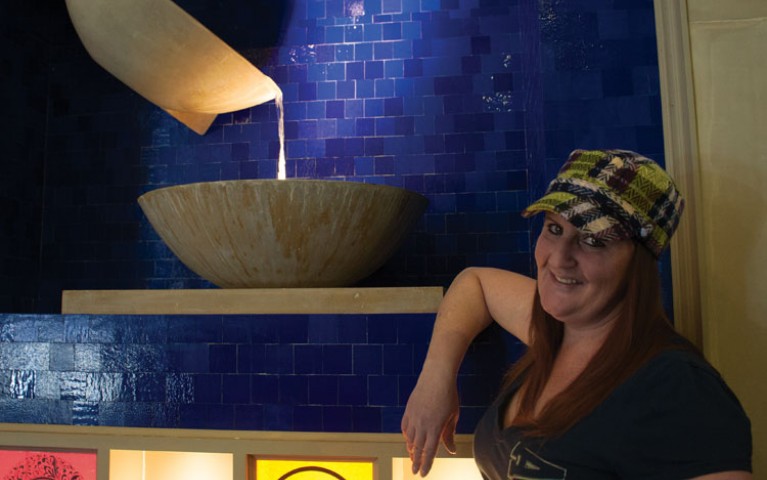From Crisis to Hope

“A combination of best clinical practices with sound public policy can make a real difference in both the lives of thousands of persons and in the health of our community as a whole.”
Katie Dougherty says it with a painful bluntness: “I didn’t grow up hoping to be a heroin addict.” And she could hardly have foreseen the eventual consequences when almost fifteen years ago a doctor prescribed Percocet for her severe back pain. Because of how it improved her mood – easing depression and anxiety – she gradually became addicted. Within a few short years, her life was a living nightmare. “There I was, a mother of four from a good background, lost in Kensington doing whatever I had to do to get another hit.”
[Listen to Katie tell her story in her own words at our YouTube channel.]
Katie’s story is playing out with alarming frequency all over the country. We are hearing more and more about the deepening epidemic of opioid addictions, including massive spikes in overdose deaths. The numbers are staggering – a 500 percent increase in opioid overdoses since 2000; in Philadelphia, more than twice as many deaths from drug overdose than from homicide in 2016.
The Project HOME community witnesses this social crisis on a daily basis. Through our street outreach to persons who are homeless and through our Hub of Hope winter drop-in center, we see the first-hand human reality of this drug epidemic. We are experiencing its toll in the neighborhoods we serve and among community members. We have been working with numerous governmental and nonprofit partners to develop effective solutions and support urgently needed policies to provide resources for solutions, both in our own programs and for the city as a whole.
In fact, a positive political initiative has created a unique and important opportunity for a meaningful response. Last year, Pennsylvania Governor Tom Wolf pushed for the creation of a network of statewide Centers of Excellence (COE). These Centers were designed to connect persons struggling with opioid addictions to comprehensive, community-based treatment. Project HOME worked with a City Task Force to implement the Governor’s strategy in Philadelphia, and are now partners, along with Prevention Point Philadelphia and Pathways to Housing PA. Our Stephen Klein Wellness Center (SKWC) hosts one of the Centers of Excellence.
A key component of the COE model is Medication Assisted Treatment (MAT). Most people are aware of methadone clinics, which is a MAT. This model provides addicted persons with specialized drugs that control opioid cravings and withdrawals. Katie, a resident at Project HOME’s JBJ Soul Homes, benefitted from the MAT model, and she can vouch for its effectiveness. “People say you’re trading one addiction for another, but for me and many others, it was a life-saver.” COE treatment also goes deeper, dealing with the whole person, offering an integration of behavioral health and physical health care from a case management team. The Centers cater treatment to the individual, understanding that he or she has a unique path in overcoming the addiction. Currently, about 30 persons are enrolled in the local program, either at the Stephen Klein Wellness Center or at the other local site, Pathways to Housing. We are only in the early stages of this initiative, but already we are encouraged that about 80 percent of SKWC participants are sober or moving toward sobriety.
“Part of the problem is a persistent social stigma toward people using substances,” says Dr. Mudit Gilotra, Director of Integrated Healthcare Services at our Stephen Klein Wellness Center, who oversees Project HOME’s Center of Excellence program. He believes the COE model demonstrates how a combination of best clinical practices with sound public policy can make a real difference in both the lives of thousands of persons and in the health of our community as a whole. He also affirms how this model of treatment fits within the broader vision of Project HOME: Real recovery requires the stability provided by housing and access to basic supports like education, healthcare, and economic opportunity.
Now in her sixth year of recovery, Katie is a passionate advocate for those still in the grips of addiction. She is certified to counsel persons with opioid addiction on HIV and Hep-C. She has worked with Prevention Point Philadelphia, reaching out to those on the streets, connecting them to treatment. She too knows that public stigmas, misinformation, and lack of understanding are obstacles to the urgently needed help. “We need to educate the public – even young kids, who could easily go into their parents’ medicine cabinets and find the medications.”
We must pay attention to the dire headlines and come to grips with the seriousness of the crisis. But we also need hope – the kind of hope embodied by Katie Dougherty, who shows the living power of recovery; Mudit Gilotra and the staff at the Stephen Klein Wellness Center COE, whose tireless and compassionate efforts to provide healing are having a real impact; and policy-makers who overcome partisan divides to forge real solutions that benefit our society. All of us must seize that hope and together build a culture of recovery.